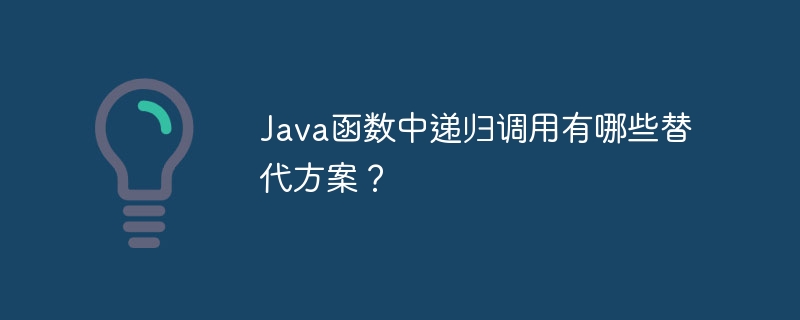Home >Java >javaTutorial >What are the alternatives to recursive calls in Java functions?
What are the alternatives to recursive calls in Java functions?
- 王林Original
- 2024-05-05 10:42:01549browse

Use iteration to replace recursive calls in Java functions
In Java, recursion is a powerful tool used to solve various problems . However, in some cases, using iteration may be a better option because it is more efficient and less prone to stack overflows.
The following are the advantages of iteration:
- More efficient because it does not require the creation of a new stack frame for each recursive call.
- Stack overflow is not easy to occur because stack space usage is limited.
Iterative methods instead of recursive calls:
There are several ways in Java to convert a recursive function into an iterative function.
1. Use the stack
Using the stack is the easiest way to convert a recursive function into an iterative function. The stack is a last-in-first-out (LIFO) data structure, similar to a function call stack.
public int factorial(int n) {
Stack<Integer> stack = new Stack<>();
stack.push(n);
while (!stack.isEmpty()) {
int curr = stack.pop();
if (curr == 1) {
return 1;
}
stack.push(curr - 1);
stack.push(curr);
}
}2. Using queues
You can also use queues to convert recursive functions into iterative functions. A queue is a first-in, first-out (FIFO) data structure, similar to a message queue.
public int factorial(int n) {
Queue<Integer> queue = new LinkedList<>();
queue.offer(n);
while (!queue.isEmpty()) {
int curr = queue.poll();
if (curr == 1) {
return 1;
}
queue.offer(curr - 1);
queue.offer(curr);
}
}3. Manually simulate the function call stack
You can also manually simulate the function call stack to implement iteration. This involves explicitly maintaining an array of stack frames and keeping track of the current stack frame via the array index.
public int factorial(int n) {
int[] stack = new int[100];
int top = -1;
stack[++top] = 1;
stack[++top] = n;
while (top > 0) {
int curr = stack[top--];
if (curr == 1) {
return stack[top--];
}
stack[++top] = curr - 1;
stack[++top] = curr;
}
}Practical case: Fibonacci sequence
Let us take the Fibonacci sequence as an example to illustrate how to use iteration instead of recursion.
// 递归
public int fib(int n) {
if (n <= 1) {
return n;
}
return fib(n - 1) + fib(n - 2);
}
// 迭代(使用队列)
public int fib(int n) {
Queue<Integer> queue = new LinkedList<>();
queue.offer(0);
queue.offer(1);
while (n-- > 1) {
int a = queue.poll();
int b = queue.poll();
queue.offer(a + b);
}
return queue.poll();
}By using iteration, we avoid the overhead of recursive calls and improve efficiency.
The above is the detailed content of What are the alternatives to recursive calls in Java functions?. For more information, please follow other related articles on the PHP Chinese website!

